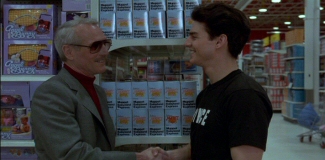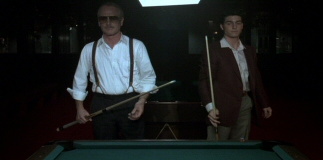|
Newest Reviews:
New Movies -
The Tunnel
V/H/S
The Tall Man
Mama Africa
Detention
Brake
Ted
Tomboy
Brownian Movement
Last Ride
[Rec]³: Genesis
Hara-Kiri: Death of a Samurai
Indie Game: The Movie
Abraham Lincoln: Vampire Hunter
Old Movies -
Touki Bouki: The Journey of the Hyena
Drums Along the Mohawk
The Chase
The Heiress
Show
People
The Strange Affair of Uncle Harry
Pitfall
Driftwood
Miracle Mile
The Great Flamarion
Dark Habits
Archives -
Recap: 2000,
2001, 2002,
2003, 2004
, 2005, 2006,
2007 , 2008
, 2009 ,
2010 , 2011 ,
2012
All reviews alphabetically
All reviews by star rating
All reviews by release year
Masterpieces
Screening Log
Links
FAQ
E-mail me
HOME
| |
The Color of Money (Martin Scorsese, 1986)
 Pop and personal filmmaking collide in Martin Scorsese’s The
Color of Money, a slightly inferior sequel to 1961’s The Hustler.
Set twenty-five years after the first installment of the Fast Eddie Felson saga,
this film has Paul Newman reprising one of his best roles to mixed effect.
Though the actor is good here (especially in the film’s first half), Scorsese
places a bit too much baggage on his thinly conceived character’s shoulders.
Despite a generally solid script, there’s been too little thought put into
what Felson has been doing in the quarter century since we last saw him. Though
we learn that he’s become a booze peddler and retained the itch for pool, the
sport that’s been his passion, he might as well have been frozen in carbonite,
Hans Solo-style, between the end of The Hustler and the start of this
film. This feeling is exacerbated because Scorsese attempts to use Newman’s
advanced age to elevate his character’s disappointments to the realm of high
tragedy. It doesn’t really work, and the moment the stakes are raised beyond
the thrill of a win, the life seems to drain from the movie. Thankfully, though,
for the bulk of the run time, The Color of Money still excels its
intended terms as a sexy genre picture, mostly thanks to an energetic star turn
courtesy of Tom Cruise.
Pop and personal filmmaking collide in Martin Scorsese’s The
Color of Money, a slightly inferior sequel to 1961’s The Hustler.
Set twenty-five years after the first installment of the Fast Eddie Felson saga,
this film has Paul Newman reprising one of his best roles to mixed effect.
Though the actor is good here (especially in the film’s first half), Scorsese
places a bit too much baggage on his thinly conceived character’s shoulders.
Despite a generally solid script, there’s been too little thought put into
what Felson has been doing in the quarter century since we last saw him. Though
we learn that he’s become a booze peddler and retained the itch for pool, the
sport that’s been his passion, he might as well have been frozen in carbonite,
Hans Solo-style, between the end of The Hustler and the start of this
film. This feeling is exacerbated because Scorsese attempts to use Newman’s
advanced age to elevate his character’s disappointments to the realm of high
tragedy. It doesn’t really work, and the moment the stakes are raised beyond
the thrill of a win, the life seems to drain from the movie. Thankfully, though,
for the bulk of the run time, The Color of Money still excels its
intended terms as a sexy genre picture, mostly thanks to an energetic star turn
courtesy of Tom Cruise.
 Cruise, in the best of his early performances, plays Vincent,
Felson’s cocky young protégé. He moves and speaks with the unguarded naiveté
of someone who’s never lost big, and when Vincent has his triumphant victory
to the tune of “Werewolves of London” (a scene as classic as Cruise’s Risky
Business dance), you suspect that half the reason that Eddie is so
infuriated is because the young man looks so vital doing it. The clashes between
Vincent and Eddie, or unrepentant youth and sour wisdom, provide the film’s
life, and when a plot twist separates them, the toll on the film is short of
disastrous, but still unwelcome. The cons and contests of the third act can’t
hold a candle to what’s come before, and even though the final round plays
nicely, avoiding the smell of fetid failure that hangs over Eddie during many of
the concluding scenes, the damage has already been done. Scorsese, in his
attempts to transcend his pop milieu, compromised it with inappropriate
seriousness. If only the director was less intent on making The Color of Money a
classic, it might have been a classic.
Cruise, in the best of his early performances, plays Vincent,
Felson’s cocky young protégé. He moves and speaks with the unguarded naiveté
of someone who’s never lost big, and when Vincent has his triumphant victory
to the tune of “Werewolves of London” (a scene as classic as Cruise’s Risky
Business dance), you suspect that half the reason that Eddie is so
infuriated is because the young man looks so vital doing it. The clashes between
Vincent and Eddie, or unrepentant youth and sour wisdom, provide the film’s
life, and when a plot twist separates them, the toll on the film is short of
disastrous, but still unwelcome. The cons and contests of the third act can’t
hold a candle to what’s come before, and even though the final round plays
nicely, avoiding the smell of fetid failure that hangs over Eddie during many of
the concluding scenes, the damage has already been done. Scorsese, in his
attempts to transcend his pop milieu, compromised it with inappropriate
seriousness. If only the director was less intent on making The Color of Money a
classic, it might have been a classic.
73
Jeremy Heilman
03-05-05
|